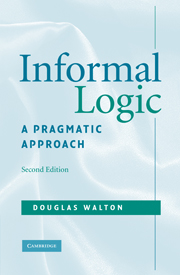Book contents
- Frontmatter
- Contents
- Preface
- Acknowledgments
- Informal Logic
- 1 Argument as reasoned dialogue
- 2 Questions and answers in dialogue
- 3 Criticisms of irrelevance
- 4 Appeals to emotion
- 5 Valid arguments
- 6 Personal attack in argumentation
- 7 Appeals to authority
- 8 Inductive errors, bias, and fallacies
- 9 Natural language argumentation
- Bibliography
- Index
3 - Criticisms of irrelevance
Published online by Cambridge University Press: 05 June 2012
- Frontmatter
- Contents
- Preface
- Acknowledgments
- Informal Logic
- 1 Argument as reasoned dialogue
- 2 Questions and answers in dialogue
- 3 Criticisms of irrelevance
- 4 Appeals to emotion
- 5 Valid arguments
- 6 Personal attack in argumentation
- 7 Appeals to authority
- 8 Inductive errors, bias, and fallacies
- 9 Natural language argumentation
- Bibliography
- Index
Summary
One of the most common criticisms made in argument is the reply “That's beside the point!” or “That's irrelevant.” However, relevance is such a broad term that the criticism of being irrelevant could refer to many different kinds of failure or shortcoming in an argument. The study of relevance in argument begins by clarifying and classifying these different types of alleged failure that can prompt the criticism that a breach of relevance has been committed.
The primary basis of allegations of irrelevance stems from an important basic feature of all reasonable dialogue. Every argument presupposes a context of dialogue in which there is an issue, or perhaps several issues, being discussed. An issue means there is a proposition or question of controversy under discussion. Typically, an issue in dialogue suggests that there are two sides to the discussion. In other words, there is a certain specific proposition being discussed, and one participant in the dialogue is committed to that proposition being true while the other participant is committed to its being false. Of course, dialogues are not always this clear or simple, but when they are of this form, the type of dialogue may be called a dispute (or disputation). A dispute is a dialogue where one side affirms a certain proposition, and the other side affirms the opposite (negation) of that proposition.
- Type
- Chapter
- Information
- Informal LogicA Pragmatic Approach, pp. 78 - 105Publisher: Cambridge University PressPrint publication year: 2008



